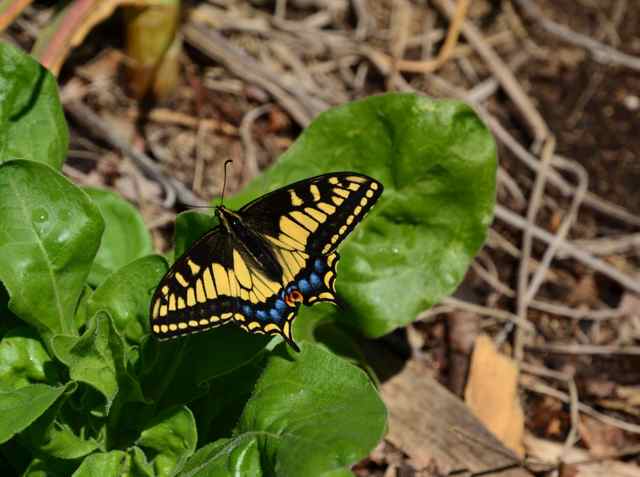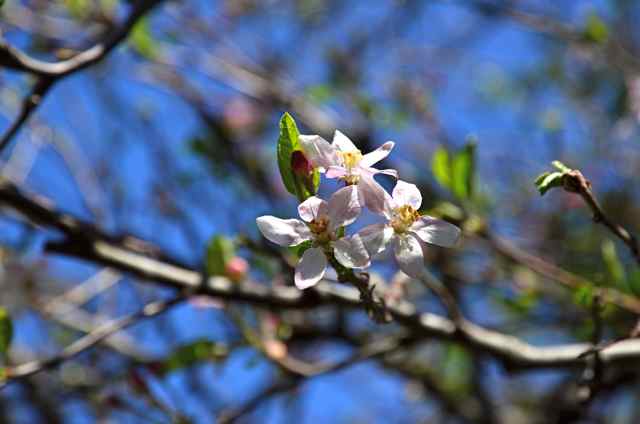Institute of Urban Homesteading
Newsletter
April 2014
Happy Spring!
Another round of rains has washed winter from the corners of our eyes and bolted the garden into vibrant spring greens with floral accents. Like all good gardeners IUH is planting seeds and the harvest we want to reap is a wiser, more reliant citizenry. We have a fine year of classes and events planned for you. This is a big newsletter--one of our most important for the year. If you only read one--read this one! And if you like this newsletter, please forward to a friend. Your recommendation is our best promotion. Hope to see you April 8th for our Spring Kick-Off!
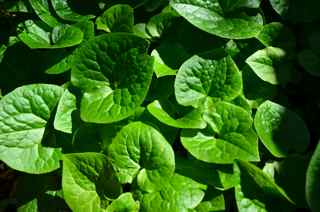
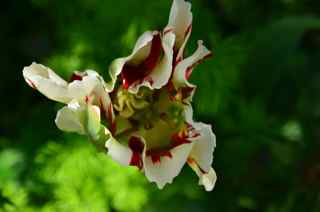
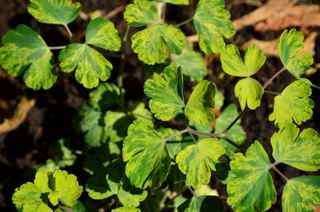
green with a splash of color
Spring Kick-Off!
Movie Night & Urban Ag Social @ The New Parkway
Tuesday April 8 Doors at 6--come socialize! Movie at 7
4274 24th St Oakland
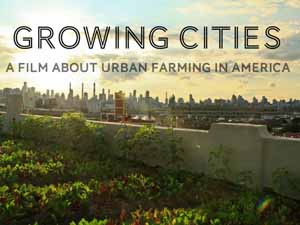
Movie: Grlowing Cities
Watch the Trailer
Door prizes!
Report Back from the Oakland Food Policy Council!
Jam Tasting & Jam Swap 1 bring a jar to taste and a jar to trade!
PLUS Q & A with Dan Susman, Filmmaker
Join the Institute of Urban Homesteading as we kick-off of our eighth year of programming with a celebration of the rise of urban agriculture.
Doors open at 6--come early to eat, chat, chill and taste jam.
Co-Sponsored By: The Living Seed Company, Transition Town Albany, Planting Justice, Oakland Food Policy Council, East Bay Urban Agricultural Alliance
Invite Friends on Facebook
Purchase Tickets
Community Design Clinic #1 Urban Gardening
Join us for community style learning. These donation based evening gatherings are meant as a place to share information and build community. Facilitated by a team of IUH instructors we'll share our successes and challenges around some of the major areas of homesteading. The first gathering on April will focus on gardening and garden design. We'll talk about a range of gardening topics based on interest: soil preparation, composting, seed starting, crop rotation, best varieties for our climate, gardening on the cheap,garden design, irrigation, dry farming and much much more! IUH faculty Ruby Blume (Beegrrl Gardens) and Maya Blow (SoulFlower Farm). Register online to receive the address and pay at the door. $5-20 suggested, No One Turned Away.
Berkeley Oakland Farm Tour Sites Announced & Tickets on Sale
This years tour is going to be the best ever! Spanning South Berkeley to East Oakland sites feature chickens, goats, greywater & rainwater catchment, ducks, veggie gardens, mushroom beds, aquaponics, and gardens from tiny to substantial. All new sites (plus one that hasn't been seen since the first year). We are still working on gathering sites for the Vallejo tour. Visit our events page to see the list of sites and how to buy tickets The farm tour raffle is on, but Brown Paper tickets won't let us talk about it on their event page--so read about it on our site before purchasing!
Vallejo Tour sites and ticketing by the end of the week!
Welcome Interns
We are fortunate to have 3 fabulous interns on board this year. 3- springs interns Mik Jew (left) and Meghan Hornstrom (right)and Speical Projects intern Alexa Davis (center) .You are sure to see them represnting us at classes, events and around town.

Swarm Season
Like many other creatures, spring is a time for bees to reproduce. When the fruit trees are blooming and the nights have warmed up, the bees come out of winter dormancy and increase their population. Then the queen bee, along with a portion of the new spring bees leave the hive in search of a new home. The parent colony remains and raises a new queen from a young female larvae. Before leaving the bees gorge on honey and nectar which will aid them making new comb when they find a suitable location. Swarming bees are not dangerous. They have nothing to defend and they are so full of honey, they can barely fly.
The flying swarm is a massive swirling of bees producing a gentle hum. They will soon land on a branch or fence a short distance from the parent colony. Clustered around their queen, they will stay there for 1-3 days while scouts bring back information about potential sites. Then, all at once, a decision is made and they fly off to their new home.
What should you do if you see a swarm? Stay calm and watch where they go. Are they going to an interim spot or populating their new home? If they are in an accessible interim location, please let a beekeeper know. This is the time they can collect the swarm. If you don't know any beekeepers, feel free to email us here and we'll forward it. Be sure to include as much information as you can: the location address, a description of where they are clustered (especially it is is high in a tree or otherwise potentially hard to reach) and a phone number if it is on private property. They don't stay long, so this should be done immediately.
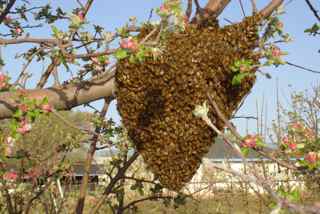
Talk Like A Beek: A Short Lexicon
Beek. Beekeeper
New-Bee. Inexperienced beekeeper
Worker Bee. Sterile, unmated female beees that carry out the tasks of the colony from nursing young to building comb and foraging pollen & nectar.
Drone. A male bee.
Queen Bee. A fertile female bee who can lay up to 1500 eggs a day. Usually only one in a colony.
Brood: The collective term for bee babies in all stages from egg, to larvae to capped brood (undergoing metamorphosis)
Colony. One queen with her daughter workers and drone sons. A bee colony can inhabit a beekeepers box a tree or even the walls of a building. A colony ranges in size from 15,00 bees in the winter to as many as 60,000 bees in the summer.
Hive. A box or basket that a beekeeper has provided as a home for the bees. People also use the term to refer to the bees and the container they are in collectively.
Swarm. A queen plus workers and drones that is temporarily homeless and looking for a home.
Feral Bee. Honey bees that are living on their own, untended by a beekeeper.
Wild Bee. A native bee indiginous to our area. These bees do not live in colonies, or produce honey. They are also called solitary bees.
Langstroth Hive. Often incorrectly called the Langstrom or Langsdorf, this is the dominant hive system used in the USA, They are the stacking white boxes we associate with bees.
Top Bar Hive. A horizontal hive where the bees build natural comb hanging from one bar rather than on pre-imprinted foundation within a square frame.
Warre Hive. A hands-off natural hive system that closely mimics what bees do in nature. Also called a vertical top bar hive, the comb is not moveable.
Foundation. Pre-iimpressed wax or plastic used by non-bnatural beekeepers that induces the bees to build as humans want them to.
Spring Weeding
A weed is any plant that is growing where you don't want it to. A volunteer is any plant you did not plant that is welcome. Thus the massive amount of poppies that have reseeded in my yard are weeds in some places and volunteers in others. Just as I finished getting rid of the weeds produced by the rain last month, the new round of showers has brought more weeds. It is important to learn to recognize weeds when they are small and pull them before they take nutrients from the soil and definitely before they flower and set seed. Always pull the weed from the roots, or they are likely to return. Learn to iidentify noxious weeds such as oxalis and bindweed. These should not be added to the compost pile, as they may not be broken down if your compost is not hot enough, instead they will further spread and repopulate your garden, Many weeds are edible or medicinal , are beloved by livestock or are valuable as insectary plants. Such plants include dandelion, cleavers, chickweed, plantain, mallow and purslane. A list of common Bay Area Weeds with pictures can be found here:
Short Takes
Urban Homesteading in The Mother Earth News “Guide to Urban Homesteading,”
Article by Rachel Kaplan, Photos by K.Ruby Blume
Like IUH on Facebook for up to the minute updates, class announcements and homesteading tips!
K.Ruby Blume at SoS Juice/Urban Farmacy
April 24th 6:30-9pm 2781 Telegraph, Oakland, 94612 FREE
Coming May 4 Community Project Day. Learn, grow, connect!
Sheet Mulching at Empress Vintage, check our calendar and FB Page for more details.
